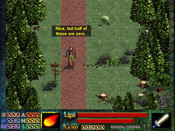Reply to Re: Is either gender more evil then the other?
If you don't have an account, just leave the password field blank.
I don't trust statistics much, as they only use a small number to measure the large.
No, that's not right. Statistics are about turning a large amount of information into a smaller amount of information, with as little loss of interesting information as possible. That means that the results will depend on what you consider interesting.
What you describe (using statistics on little information and suggesting that it would have been the same if it was used on a larger data set) is a "sample"; if used properly, there's nothing wrong with that, and it is indeed very likely that the results are correct.
However, there are several problems. The obvious problem is that giving only the results of your statistics doesn't allow people to check if you did it right. It's very easy to do statistics wrong, and if you do, the results don't mean anything.
A more important thing is that some people intentionally do it wrong, for the purpose of "proving" something that they know isn't true. "There's lies, dang lies and statistics." Which brings us back to the subject: those people are evil, IMO. But unfortunately they don't seem to be rare.
the media here can legally lie.
They can do that anywhere. That's called "freedom of press". This only becomes a problem when they are not independent. Journalists should try to bring news and give people objective information about what's happening in the world. They should provide a platform for people to discuss the news. If they are actively pushing the public opinion one way or the other (by adding their own opinion too much, or by selectively publishing reader's letters), the people no longer know what is true or false. Then your country is in trouble.
And yes, I believe the US is very much in trouble in that respect.
No, that's not right. Statistics are about turning a large amount of information into a smaller amount of information, with as little loss of interesting information as possible. That means that the results will depend on what you consider interesting.
What you describe (using statistics on little information and suggesting that it would have been the same if it was used on a larger data set) is a "sample"; if used properly, there's nothing wrong with that, and it is indeed very likely that the results are correct.
However, there are several problems. The obvious problem is that giving only the results of your statistics doesn't allow people to check if you did it right. It's very easy to do statistics wrong, and if you do, the results don't mean anything.
A more important thing is that some people intentionally do it wrong, for the purpose of "proving" something that they know isn't true. "There's lies, dang lies and statistics." Which brings us back to the subject: those people are evil, IMO. But unfortunately they don't seem to be rare.
the media here can legally lie.
They can do that anywhere. That's called "freedom of press". This only becomes a problem when they are not independent. Journalists should try to bring news and give people objective information about what's happening in the world. They should provide a platform for people to discuss the news. If they are actively pushing the public opinion one way or the other (by adding their own opinion too much, or by selectively publishing reader's letters), the people no longer know what is true or false. Then your country is in trouble.
And yes, I believe the US is very much in trouble in that respect.









